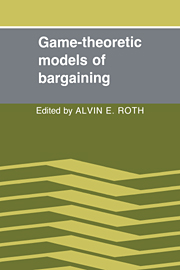Book contents
- Frontmatter
- Contents
- List of contributors
- Preface
- Chapter 1 Editor's introduction and overview
- Chapter 2 Disagreement in bargaining: Models with incomplete information
- Chapter 3 Reputations in games and markets
- Chapter 4 An approach to some noncooperative game situations with special attention to bargaining
- Chapter 5 Infinite-horizon models of bargaining with one-sided incomplete information
- Chapter 6 Choice of conjectures in a bargaining game with incomplete information
- Chapter 7 Analysis of two bargaining problems with incomplete information
- Chapter 8 Sequential bargaining mechanisms
- Chapter 9 The role of risk aversion in a simple bargaining model
- Chapter 10 Risk sensitivity and related properties for bargaining solutions
- Chapter 11 Axiomatic theory of bargaining with a variable population: A survey of recent results
- Chapter 12 Toward a focal-point theory of bargaining
- Chapter 13 Bargaining and coalitions
- Chapter 14 Axiomatic approaches to coalitional bargaining
- Chapter 15 A comment on the Coase theorem
- Chapter 16 Disclosure of evidence and resolution of disputes: Who should bear the burden of proof?
- Chapter 17 The role of arbitration and the theory of incentives
Chapter 3 - Reputations in games and markets
Published online by Cambridge University Press: 23 September 2009
- Frontmatter
- Contents
- List of contributors
- Preface
- Chapter 1 Editor's introduction and overview
- Chapter 2 Disagreement in bargaining: Models with incomplete information
- Chapter 3 Reputations in games and markets
- Chapter 4 An approach to some noncooperative game situations with special attention to bargaining
- Chapter 5 Infinite-horizon models of bargaining with one-sided incomplete information
- Chapter 6 Choice of conjectures in a bargaining game with incomplete information
- Chapter 7 Analysis of two bargaining problems with incomplete information
- Chapter 8 Sequential bargaining mechanisms
- Chapter 9 The role of risk aversion in a simple bargaining model
- Chapter 10 Risk sensitivity and related properties for bargaining solutions
- Chapter 11 Axiomatic theory of bargaining with a variable population: A survey of recent results
- Chapter 12 Toward a focal-point theory of bargaining
- Chapter 13 Bargaining and coalitions
- Chapter 14 Axiomatic approaches to coalitional bargaining
- Chapter 15 A comment on the Coase theorem
- Chapter 16 Disclosure of evidence and resolution of disputes: Who should bear the burden of proof?
- Chapter 17 The role of arbitration and the theory of incentives
Summary
Introduction
The notion of reputation found in common usage represents a concept that plays a central role in the analysis of games and markets with dynamic features. The purpose of this exposition is to describe how mathematical constructs roughly interpretable as reputations arise naturally as part of the specification of equilibria of sequential games and markets. In addition, several examples will be sketched, and a few of the economic applications surveyed.
The main theme here is that reputations account for strong intertemporal linkages along a sequence of otherwise independent situations. Moreover, from examples one sees that these linkages can produce strategic and market behavior quite different from that predicted from analyses of the situations in isolation. The economic applications, for instance, indicate that a firm's reputation is an important asset that can be built, maintained, or “milked,” and that reputational considerations can be major determinants of the choices among alternative decisions.
The key idea is that one's reputation is a state variable affecting future opportunities; moreover, the evolution of this state variable depends on the history of one's actions. Hence, current decisions must optimize the tradeoffs between short-term consequences and the longer-run effects on one's reputation. As the discussion proceeds, this general idea will be shown to have a concrete formulation derived from the analysis of sequential games.
Semantics
In common usage, reputation is a characteristic or attribute ascribed to one person (firm, industry, etc.) by another (e.g., “A has a reputation for courtesy”).
- Type
- Chapter
- Information
- Game-Theoretic Models of Bargaining , pp. 27 - 62Publisher: Cambridge University PressPrint publication year: 1985
- 156
- Cited by



